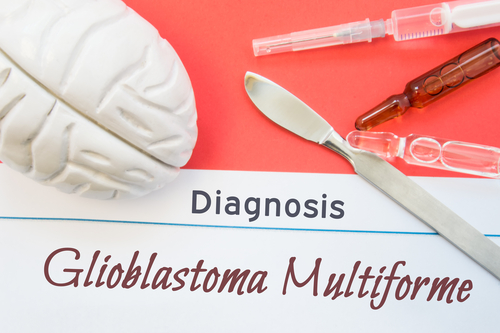The Phase 1/2a clinical trial evaluating VBI Vaccines‘ cancer vaccine, VBI-1901, in recurrent glioblastoma multiforme (GBM) has dosed its first patient, the company announced.
This follows the clearance of an Investigative New Drug (IND) application for VBI-1901 by the U.S. Food and Drug Administration in August 2017.
“We are excited to announce that the first patient has been dosed in this initial clinical study of VBI-1901, our first clinical study in immuno-oncology,” Jeff Baxter, president and CEO of VBI, said in a press release.
Glioblastoma multiforme is one of the most common and aggressive brain tumors. Even with aggressive treatment – surgery, followed by radiation and chemotherapy – patients generally have negative outcomes, revealing the urgent need for new and more effective treatments.
Targeting cytomegalovirus (CMV) proteins has become an attractive strategy for treating GBM. In fact, more than 90 percent of GBM tumors are infected with CMV, so targeting the virus would mean targeting cancer cells. Recent studies have shown that anti-CMV dendritic cell vaccination extended the survival of GBM patients.
VBI-1901 is a cancer vaccine that targets two cytomegalovirus (CMV) proteins (gB and pp65). The proteins are enclosed inside a virus-like particle, which imparts greater immunity than vaccination with the target proteins alone, the company explains on its website.
“Recurrent GBM is a devastating CMV-associated tumor with few effective treatment options,” Baxter said. “We developed VBI-1901 to target two highly immunogenic CMV antigens, and, based on preclinical studies, we believe it has the potential to induce a strong anti-tumor immune response in these patients.”
The open-label, multi-center trial (NCT03382977) will be conducted in two parts. First, 18 patients will receive escalating doses of VBI-1901 in combination with GM-CSF, a potent immune stimulatory factor. This part of the study is meant to evaluate the safety and tolerability of the vaccine, and determine its optimal dose.
Part B of the trial will include an additional 10 patients to further explore the safety and effectiveness of the optimal dose. Patients will receive the treatment every four weeks until tumor progression.
The study will be conducted at New York Presbyterian-Columbia University Medical Center in New York City, and Inova Health System in Falls Church, Virginia, two leading U.S. clinical and research sites.
The study is currently enrolling adults with recurrent WHO grade 4 glioblastoma who have had a prior treatment regimen. For more information, visit the trial registry webpage here.


